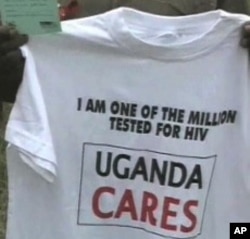A controversial bill under consideration in Uganda’s parliament is being challenged by President Yoweri Museveni on foreign policy grounds. The 23-year incumbent says the measure, which would make some homosexual acts punishable by death and others by life imprisonment, would discourage foreign investment and might infringe on obligations to protect human rights defenders and medical personnel who treat Ugandan HIV and AIDS patients.
Msia Clark is professor of Pan-African studies at Cal State University in Los Angeles. California, and serves as Uganda country specialist for Amnesty International in the United States. She points out that the bill resonates with many Ugandans for its traditional values, and that lawmaker David Bahati, who introduced it with backing from American evangelical groups, is determined not to back down on its criminal provisions.
“Clearly, he’s really trying to make a name for himself, politically and socially within Uganda. He also does come from an increasingly vocal community in Uganda that is increasingly anti-gay, increasingly in support of the stripping of the rights of the LGBT community that says that they feel homosexuality is a threat to their way of life, is a threat to Ugandan society. And so the rhetoric that he’s putting out there is that he’s trying to save the Ugandan family. He’s trying to save children from being abused by gay men,” said Clark.
But President Museveni and others say the measure goes too far and would work to the country’s disadvantage in the international community. Professor Clark notes that though Mr. Museveni is not an ardent advocate of gay rights, he clearly understands the consequences of passing such a law.
“On one hand, Museveni doesn’t want to lose his support of western countries, especially the United States. Members of Congress have come out in opposition to the bill. President Obama has also mentioned concerns which some of the drastic measures of the bill take. On the other hand, there is an election coming up. And if Museveni appears to be in support of the gay rights activists, then he could also have problems next year when he possibly runs for reelection,” she explains.
Clark recognizes it would also likely discourage Uganda’s foreign investors.
“One of the things that recently came out is the link between Christian evangelists and Uganda, where there has been money that has poured into Uganda from the American evangelical community in support of the Christian community there, where this bill originated from. But then, there’s the other aspect, where western donors are saying that if this bill passes, then they will pull up on donations of foreign funding into Uganda. And of course, the money coming in from foreign governments is much more substantial than that coming in from the conservative Christian community in America,” she acknowledged.
Over the Museveni years, Uganda has won accolades among African and foreign leaders for its public commitment in reducing the transmission of HIV/AIDS. Professor Clark says that it is unlikely the country’s citizens will permit parliament to forsake this leadership role by passing the anti-gay legislation with what she calls the harsh criminal penalties of its current draft form.







